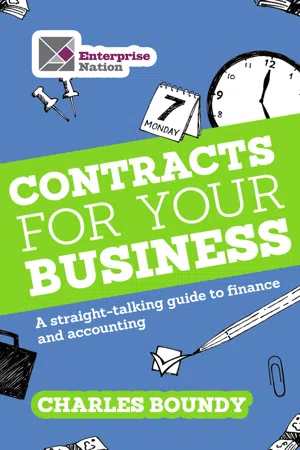
Contracts for Your Business
A straightforward guide to contracts and legal agreements
- 190 pages
- English
- ePUB (mobile friendly)
- Available on iOS & Android
About this book
When running your own business, it can be easy to believe that contracts can wait. But getting the best (or avoiding the worst) from contracts is often a major factor in how well and how quickly a business succeeds.This book, from legal expert and entrepreneur Charles Boundy, provides business owners and managers with everything they need to stay on top of contracts and avoid getting bogged down in legalese.The book gives an easy-to-follow overview of:- how to make or avoid making a contract- what to include and what to look for in contracts- how to have a contract achieve what you want at the price you have agreed- how to identify and manage major contract risks- how to approach the negotiation of key issues- how to draft and manage a contract to best effect- what to do (and not do) if things go wrong.A focused guide for the time-pressed, this is an indispensable tool for all businesses. Read it and stay successfully on top of the many contractual issues that businesses face every week.
Frequently asked questions
- Essential is ideal for learners and professionals who enjoy exploring a wide range of subjects. Access the Essential Library with 800,000+ trusted titles and best-sellers across business, personal growth, and the humanities. Includes unlimited reading time and Standard Read Aloud voice.
- Complete: Perfect for advanced learners and researchers needing full, unrestricted access. Unlock 1.4M+ books across hundreds of subjects, including academic and specialized titles. The Complete Plan also includes advanced features like Premium Read Aloud and Research Assistant.
Please note we cannot support devices running on iOS 13 and Android 7 or earlier. Learn more about using the app.
Information
Chapter 1. Basics Contract
1.1 What is a contract?
- actual agreement on all the essential terms of the deal;
- sufficient clarity and certainty as to those terms;
- an agreed price or other exchange value (called ‘consideration’);
- the intention to have a legal commitment.
1.2 What about the need for agreement?
- Stan Smith offers to sell Jenny Jones a computer system for her new business. He quotes a price, a delivery date and a fee for installation, commissioning and training.
- Jenny Jones thanks Smith for his offer, but says that whilst she would like to deal with him, she can get a better deal. That could be the end of the story.
- However, Jones goes on to say that she would buy from Smith if he reduced his price by 10% and included the additional costs within it. That is a counter-offer, open for Smith to accept or not. Note that if Smith refuses, Jones cannot go back to his original offer (unless Smith agrees), as this was cancelled by her counter offer.
- Smith might back away, but if he agrees Jones’s proposal, that can create a contract. If, however, he throws in the extras and proposes a 5% discount rather than the 10% Jones requested, that is a further counter-offer, open for Jones to accept or refuse in turn.
- Unless and until Smith and Jones reach agreement, meaning that offer and acceptance match one another on all the essentials, there will be no contract.
- what goods or services are to be supplied;
- by whom and to whom;
- what quantity or quality standards apply;
- what price (or exchange value) is to be paid or provided, and
- when and how this is to happen.
1.3 Clarity and certainty – what happens if everything is not clear?
- terms implied by legislation – legislation (e.g. the Sale of Goods Act) may imply some terms, such as that the goods are in satisfactory condition and fit for purpose (#4.2);
- business efficacy – where all the main terms are agreed and there is clear intent to have a binding agreement, the courts may imply a term where it is necessary to make the agreement work commercially;
- previous dealings between the same parties – where a ‘course of dealings’ on previously agreed terms is established between the parties (#4.3); and
- terms implied by ‘custom and practice’ – a fall-back, but not to be relied on; each person’s understanding of normal trade usage can differ, so if it’s important to you it’s best to set out clearly what is expected.
1.4 I understand price but what is ‘consideration’?
1.5 Legal commitment
1.6 When do I need to have a written contract?
Table of contents
- Cover
- Publishing details
- About the Author
- Preface
- Introduction
- Chapter 1. Basics Contract
- Chapter. Negotiating Contracts
- Chapter 3. Written Contracts
- Chapter 4. Selling Goods
- Chapter 5. Supplying Services
- Chapter 6. Payment Terms
- Chapter 7. Innovation & Technology Issues
- Chapter 8. Contracts & Risk
- Chapter 9. Living with Contracts
- Chapter 10. Ending Contracts
- Summary 10 Point Checklist
- Further reference
- Acknowledgements
- Great business reads from Enterprise Nation